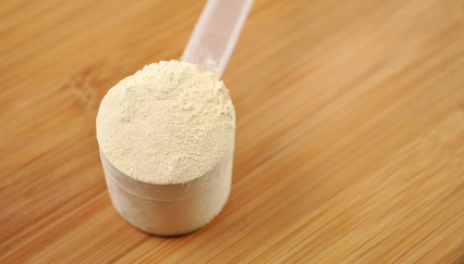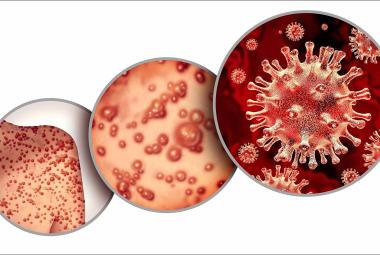Phenylketonuria (PKU) is an inherited metabolic disorder in which an affected person is less able to process the amino acid phenylalanine. Abnormally high levels of phenylalanine in the blood and tissues can cause a variety of toxic effects, including brain damage. All infants born in hospitals in the United States, and much of the rest of the first world, are routinely tested for PKU. With proper dietary management, most PKU patients have good outcomes.1
Phenylalanine is present in most animal and plant proteins. As a general rule, high protein meals such as meat, eggs, nuts, and beans will also deliver a high dose of phenylalanine. It is also present in some unusual places such as basil and the artificial sweetener Aspartame. Medications and commercial food products that contain phenylalanine are required to be labeled as such. The process of creating a phenylalanine-free diet is very complicated and should be undertaken with the help of a trained dietician. The success of this diet is directly dependent on how strictly it is observed.2
In order to address the question of pregnancy and breastfeeding as they relate to PKU, several different scenarios need to be considered.
PKU in a pregnant woman or a woman desiring to become pregnant
Any woman desiring to become pregnant should seek out pre-conception counseling as part of routine gynecological care. In addition to optimizing the mother’s health, a discussion of known or suspected genetic disorders can help to guide pregnancy planning and early interventions.3 In the case of maternal PKU, strict dietary control to maintain low blood phenylalanine levels is critical to the healthy formation of the fetus. Phenylalanine transfer across the placenta is substantial. Even dietary changes initiated late in the pregnancy, or into childhood, provide significant benefit.4
PKU in a breastfeeding mother with a normal baby
Evidence strongly suggests that elevated phenylalanine levels in the mother’s bloodstream produce proportionately elevated levels in the breastmilk. However, this does not seem to produce elevated levels in the baby’s blood. No mechanism for this phenomenon has been proven, but it is likely due to the baby’s intact ability to metabolize and clear the excess amino acid.5 Regardless of the baby’s status, it is still recommended that all phenylketonuric adults maintain a phenylalanine-free diet for their own health. Breastfeeding is encouraged in this circumstance.
PKU in a baby being breastfed by a normal mother
The developing baby is very sensitive to phenylalanine in the diet. Levels of phenylalanine in human milk were found to be lower than in any formula on the market. However, mothers with milk supply problems may still benefit their child with a partial breastfeeding regimen. Babies with PKU who are breastfed along with formula milk containing low phenylalanine were found to have a lower phenylalanine intake and higher IQ score than infants fed only on formula containing low phenylalanine.5 A pediatrician can calculate the amount of formula the infant can receive and still keep the phenylalanine at appropriate levels. Laboratory monitoring of infant phenylalanine levels is important to guide therapy. However, there is no expert consensus on what level of phenylalanine is considered “safe.”
A recent literature review covering large numbers of mothers that breastfed an infant with PKU, suggested that the vast majority of women in this situation manage continue to breastfeed their infant successfully, and without problems in the infant.6
PKU in both mother and breastfeeding child
This scenario will likely require some degree of laboratory monitoring of both mother and child. If the mother keeps her phenylalanine level low through strict dietary control, she should still be able to breastfeed as normal.
James Abbey, MD
InfantRisk Center
References:
1. Schwahn BC. Chapter 135. Hyperphenylal-Aninemias. In: Rudolph CD, Rudolph AM, Lister GE, First LR, Gershon AA, eds. Rudolph's Pediatrics, 22e. New York, NY: The McGraw-Hill Companies; 2011.
2. What are common treatments for phenylketonuria (PKU)? 10/23/2013. Available at: http://www.nichd.nih.gov/health/topics/pku/conditioninfo/Pages/treatments.aspx. Accessed 07/14/2014.
3. ACOG. The importance of preconception care in the continuum of women's health care. ACOG Committee Opinion No. 313. 2005;106:665-666.
4. Burgard P. Development of intelligence in early treated phenylketonuria. European journal of pediatrics. Oct 2000;159 Suppl 2:S74-79.
5. Riordan J WK. Breastfeeding and human lactation: Jones and Bartlett Publishers; 2010.
6. Banta-Wright SA, Press N, Knafl KA, Steiner RD, Houck GM. Breastfeeding infants with phenylketonuria in the United States and Canada. Breastfeeding medicine : the official journal of the Academy of Breastfeeding Medicine. Apr 2014;9(3):142-148.







